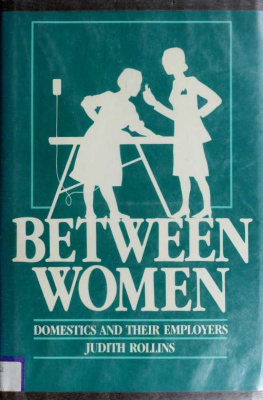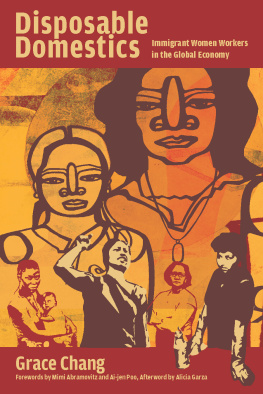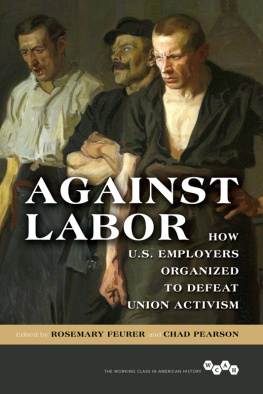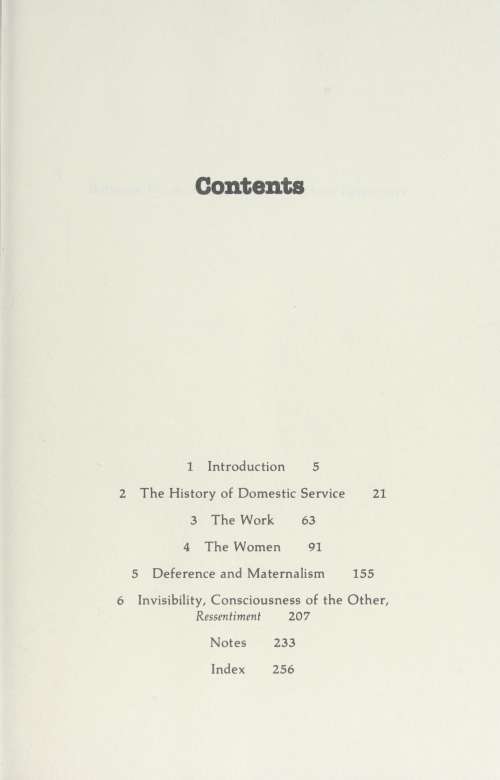This book made available by the Internet Archive.
To my grandparents, Edith and Izzy, and the Wades
Acknowledgments
Support for the writing of this book has come from many sources. Forming the core of the support were Brandeis faculty members Paula Rayman, Gordon Fellman, Egon Bittner, Kurt H. Wolff, and Karen Fields who saw me through both the writing of my dissertation and the revising of it into this book with remarkable constancy of intellectual stimulation and encouragement. Paula Rayman and Karen Fields, in very different ways, provided the critical contributions; their empowering support and thoughtful comments strengthened and clarified my writing.
A number of others also contributed in significant ways: Hussein Abdilahi Bulhan and Alan Klein were extremely helpful in thinking through the dissertation; Carmen
Acknowlegments viii
Sirianni and Phyllis Palmer made invaluable suggestions for revising it into a book; Bonnie Thornton Dill began helping me out of her sense of sisterhood long before we met and has continued to be a source of inspiration, information, and encouragement; Stephen London and Elaine Hagopian extended themselves in innumerable ways, creating an environment in the Sociology Department at Simmons which enhanced my productivity and facilitated the completion of the manuscript; and Rita Oriani typed the manuscript quickly and accurately, often inconveniencing herself in order to make deadlines.
But my deepest debt is to the womendomestics and employerswho gave their time and told the stories that form the essence of the book. Their stories, which led me to entirely new places, into different worlds and other times, into joy and laughter and pain and sadnesstheir stories enriched me far more than is evident in this book. For their taking me on these journeys into their minds and their pasts, I am profoundly grateful.
And it was financial support from the National Fellowships Fund, the American Association of University Women, and Simmons College that made the entire project possible.
Between Women: Domestics and Their Employers

1. Introduction
The Research Problem
In social science literature, there is in fact a good deal of writing on the social-psychological aspects of domination. 1 Yet, the overall discussion of liberation from oppression whether political, sexual, or racialtends to emphasize economic change as the most fundamental aspect of change toward more just social systems. Research on the critical importance of the minds of people in creating and maintaining hierarchical systems seems to have been accepted as a weak complement to that on the importance of material arrangements. Too weak, in my opinion: the dialectic between consciousness and the material world is not one between elements unequal in weight or importance.
Introduction
Certainly economic rearrangements are entirely necessary for class, gender, and racial stratification to be eliminated. But my objective is to reiterate, as others have done before me, that the ideas, attitudes, thoughts, and emotions of people must also be examined, understood, and "rearranged" if the objectifying and exploitation of humans by other humans is to cease. Any effort to destroy relationships of domination must take the social-psychological dimensions of that domination into full account or, as history suggests, 2 any more egalitarian economic arrangements that are established will eventuate into only new hierarchical forms.
It is clear that the energy within people toward creating hierarchical social systems has been strong and omnipresent. The material conditions thus created further nurture this energy but are not the sole cause of its continued existence and strength. The conscious and unconscious minds of interrelating people and their interpretations of the meanings of the forms of interrelating also have the power to generate and perpetuate ideas of inequality. While the types of economic systems that have institutionalized inequality have been varied, all have included interpersonal rituals that somehow reinforced the desire for accepting the systemic inequality of entire categories of people. It is the forms, uses, and meanings of such interpersonal rituals, as expressed in the relationship between black female domestic servants and their white female employers, that are the focus of this study.
Examining this particular relationship allows me to explore the dynamics of a unique form of an important labor arrangement. It is important because domestic service has existed in all types of hierarchical social systems, suggesting that the occupation is both congruent with and useful to stratification. (If so, how? Might some of its value to hierarchies be non-material as well as material?) It is unique because in no other labor arrangement is it typical
Introduction
for both employer and employee to be female, both members of the subordinate gender of all societies. (Does the gender of the parties affect the social position of this archetypical service occupation and the content of the relationship between employer and employee?) And the interracial form of the arrangement deserves attention because it reflects the racial division of labor in the overall society, exemplifies a case of "occupational ghettoization," and typifies the cross-cultural pattern of the darker domestic serving the lighter mistress 3 itself a reflection of the world-wide stratification pattern. (How do the racial attitudes of the women affect the relationship? And are interracial relations between women distinct in any way from those between men or between men and women?) Thus, examining the relationship between black female domestics and their white female employers does, indeed, afford an extraordinary opportunity: the exploration of a situation in which the three structures of power in the United States todaythat is, the capitalist class structure, the patriarchal sex hierarchy, and the racial division of laborinteract. As Zillah Eisenstein has stated: "Women share an oppression with each other; but what they share as sexual oppression is differentiated along class and racial lines in the same way that patriarchal history has always differentiated humanity according to class and race." 4 Essentially, how class and race inform this female-female work relationship and the meaning of the relationship both to the women involved and to the larger society are the central issues to be addressed in this book.














